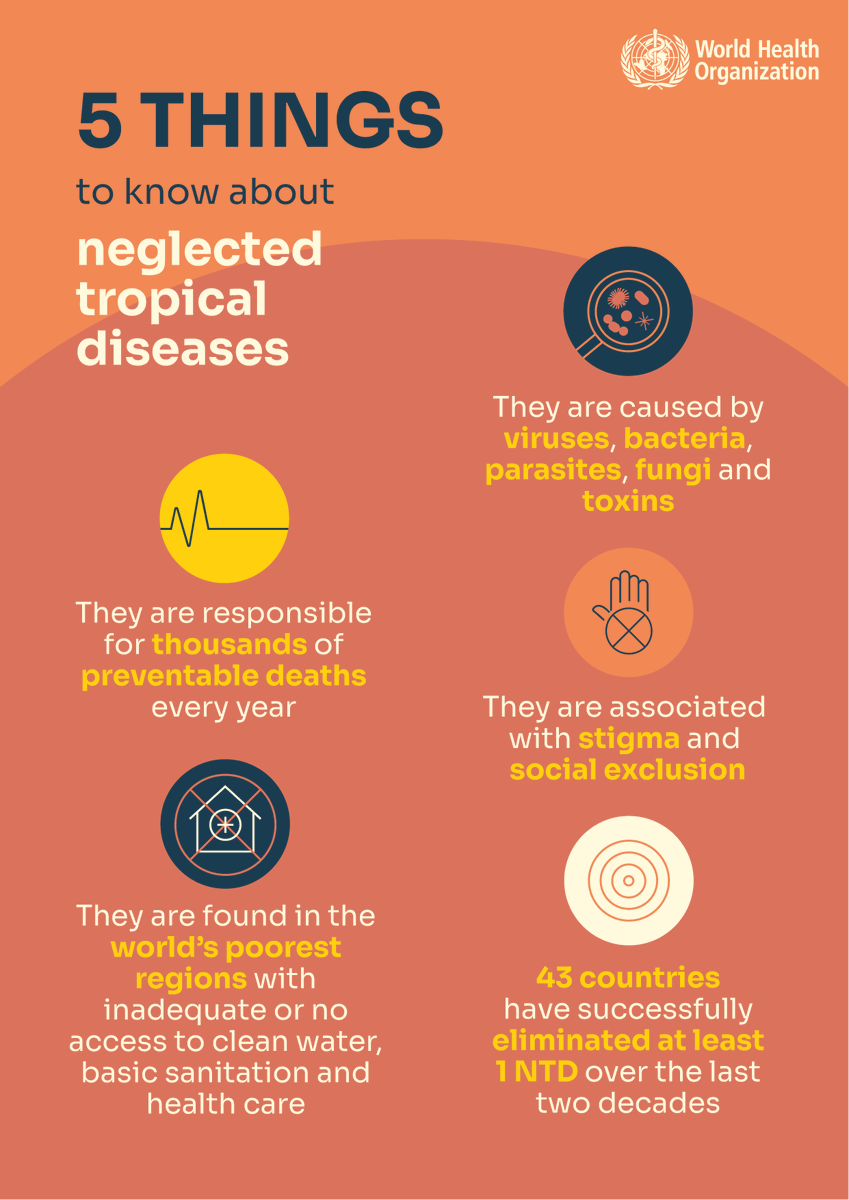
@DrTedros "Past Sunday marked World Neglected Tropical Diseases Day. Neglected tropical diseases affect the poorest & most marginalized communities, & the #COVID19 pandemic has made things worse, badly disrupting services to prevent, detect & treat them"-@DrTedros
https://twitter.com/WHO/status/1487573913953517573?s=20&t=wVuGrIs_PBo2eUkKl7_8zw
@DrTedros "Nevertheless, with support from WHO and our partners, five countries eliminated a neglected tropical disease last year: Gambia and Myanmar eliminated trachoma; Côte d’Ivoire and Togo eliminated human African trypanosomiasis, and Malawi eliminated lymphatic filariasis"-@DrTedros
@DrTedros "And only 14 cases of Guinea worm disease were reported last year from 4 countries, taking us ever closer to the eradication of this ancient disease"-@DrTedros #BeatNTDs
@DrTedros "This past Sunday also marked two years since I declared a public health emergency of international concern – the highest level of alarm under international law – over the spread of #COVID19"-@DrTedros
https://twitter.com/DrTedros/status/1487805308768604162?s=20&t=wVuGrIs_PBo2eUkKl7_8zw
@DrTedros "At the time, there were fewer than 100 cases and no deaths reported outside China. Two years later, more than 370 million #COVID19 cases have been reported, and more than 5.6 million deaths – and we know these numbers are an underestimate"-@DrTedros
https://twitter.com/WHO/status/1488517838612615171?s=20&t=6N5CxRGFKZLMgKH9fJfsRA
@DrTedros "Since Omicron was first identified just 10 weeks ago, almost 90 million cases have been reported to WHO - more than were reported in the whole of 2020. We are now starting to see a very worrying increase in deaths, in most regions of the world"-@DrTedros #COVID19
@DrTedros "We’re concerned that a narrative has taken hold in some countries that because of 💉, and because of Omicron’s high transmissibility and lower severity, preventing transmission is no longer possible, and no longer necessary. Nothing could be further from the truth"-@DrTedros
@DrTedros "More #COVID19 transmission means more deaths. We are not calling for any country to return to so-called lockdown. But we are calling on all countries to protect their people using every tool in the toolkit, not vaccines alone"-@DrTedros
https://twitter.com/WHO/status/1488518306545999879?s=20&t=6N5CxRGFKZLMgKH9fJfsRA
@DrTedros "It’s premature for any country either to surrender, or to declare victory. This virus is dangerous, and it continues to evolve before our very eyes. WHO is currently tracking four sub-lineages of the Omicron variant of concern, including BA.2"-@DrTedros #COVID19
@DrTedros "This virus will continue to evolve, which is why we call on countries to continue testing, surveillance and sequencing. We can’t fight this virus if we don’t know what it’s doing. And we must continue to work to ensure all people have access to vaccines"-@DrTedros
@DrTedros "At the same time, it’s also clear that as this virus evolves, so vaccines may need to evolve. Variants of SARS-CoV-2 may continue to escape neutralizing antibodies induced by vaccines against prior variants"-@DrTedros #COVID19
@DrTedros "In addition, the reservoir of beta coronaviruses is large, and new crossovers to humans is likely. If we prepare now, the time required for large scale vaccine manufacture will be reduced and lives will be saved"-@DrTedros #COVID19
https://twitter.com/WHO/status/1488518788941295621?s=20&t=6N5CxRGFKZLMgKH9fJfsRA
@DrTedros "On Friday last week, WHO held our latest global consultation on #COVID19 vaccines research, and on the future need for vaccines that are effective across a broad spectrum of coronaviruses"-@DrTedros
@DrTedros "We continue to engage with scientists from the public and private sectors to exchange the latest information and guide the future development of new vaccines"-@DrTedros #COVID19
https://twitter.com/WHO/status/1488519008286646275?s=20&t=6N5CxRGFKZLMgKH9fJfsRA
@DrTedros "It’s one example of how even as we support countries to fight the pandemic now, we are also working to prepare for the future, and to address its longer-term consequences"-@DrTedros #COVID19
https://twitter.com/WHO/status/1488519074283991047?s=20&t=6N5CxRGFKZLMgKH9fJfsRA
@DrTedros "That includes the challenge of medical waste. Today, WHO published a new report on the burden of medical waste from the #COVID19 pandemic, threatening human and environmental health and exposing the need to improve waste management"-@DrTedros
https://twitter.com/WHO/status/1488425523101450241?s=20&t=wVuGrIs_PBo2eUkKl7_8zw
@DrTedros "#HealthWorkers and members of the public rely on huge amounts of personal protective equipment, tests, chemicals, syringes, needles, and other disposable products to protect ourselves and others. But after we’ve used it, most of it ends up as waste"-@DrTedros
@DrTedros "30% of health facilities globally, and 60% in the least developed countries, are not equipped to handle existing medical waste loads, let alone the additional #COVID19 load"-@DrTedros
https://twitter.com/WHO/status/1488485260904042500?s=20&t=wVuGrIs_PBo2eUkKl7_8zw
@DrTedros "This potentially exposes #healthworkers to needle stick injuries, burns, infection, and affects communities living near poorly-managed landfills and waste disposal sites"-@DrTedros #COVID19
https://twitter.com/WHO/status/1488519553286119429?s=20&t=6N5CxRGFKZLMgKH9fJfsRA
@DrTedros "The report makes a set of recommendations, including using eco-friendly packaging and shipping, safe and reusable gloves and medical masks, recyclable or biodegradable materials, and cleaner waste treatment technologies and recycling"-@DrTedros #COVID19
https://twitter.com/WHO/status/1488519271806390281?s=20&t=6N5CxRGFKZLMgKH9fJfsRA
@DrTedros "The report is a reminder that although the #COVID19 pandemic is the most severe health crisis in a century, it is connected with many other challenges that countries face"-@DrTedros
@DrTedros "Last week, #EB150 met to discuss huge range of challenges & how to address them. In particular, our Member States asked us to develop a set of proposals on strengthening the 🌐 health architecture for emergency preparedness, response & resilience, to present to #WHA75"-@DrTedros
• • •
Missing some Tweet in this thread? You can try to
force a refresh













